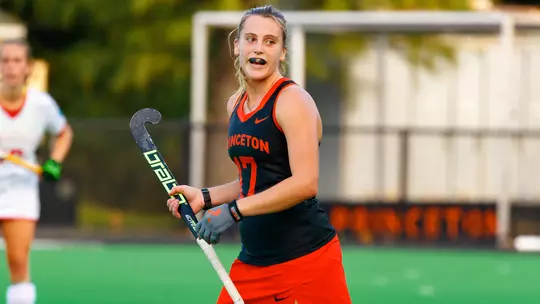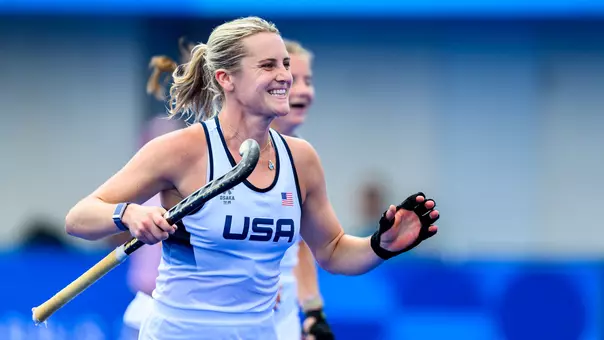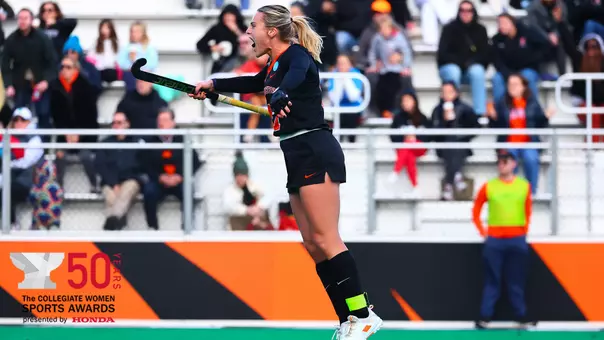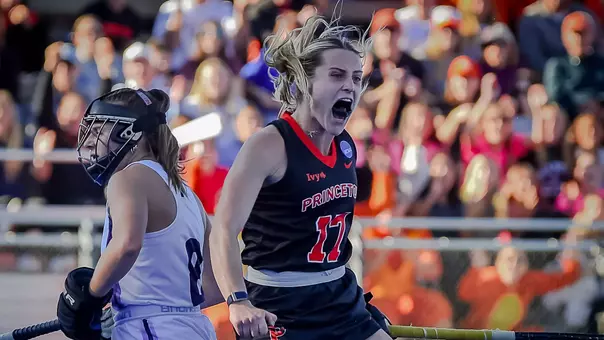Princeton University Athletics
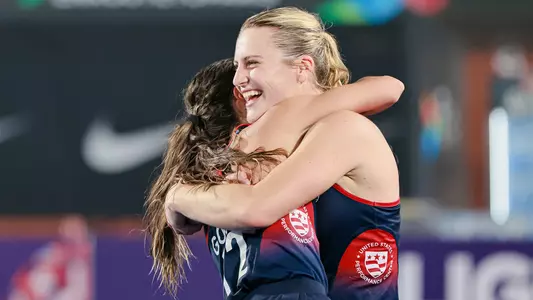
Princeton In Paris Feature: Beth Yeager
July 24, 2024 | Field Hockey
A dream, by its very denotation, exists in the mind. If you start with that reality, then perhaps Beth Yeager was only dreaming that evening in January.
Was she awake? Was she asleep? Somewhere in between, in that lucid state where it’s hard to tell what’s real and what isn’t? Was she in a haze, hovering over a field hockey pitch in India, or was she on the pitch, actually playing in a game?
And then — a loud “plunk,” that unmistakable sound that a field hockey ball makes when it smacks against the wood in the back of the cage. Japan 1, United States 0.
Now Beth Yeager was wide awake.
Her lifelong dream was on the verge of becoming a nightmare.
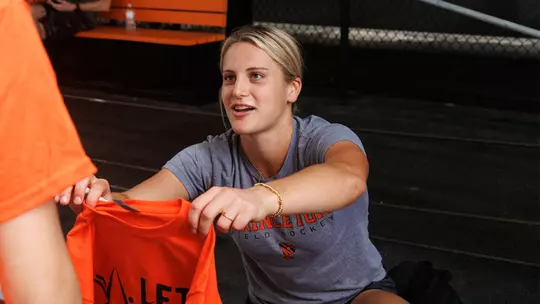
Beth Yeager is standing on a sidewalk on Greenwich Avenue, pointing north. It was in this Connecticut town that she first began to play field hockey, and she is now looking in the general direction of where it all began, and then, beyond that, her home.
“They’re that way,” she says. “They’re kind of far, though.”
Far? It's an interesting choice of words. It’s a matter of perspective, it would seem. Would you want to walk from downtown, up Greenwich Ave., past all the restaurants and shops and all the way to the field where Yeager first picked up a stick? Probably not, even on a nice day like this one.
On the other hand, in Yeager’s world, “far” does not mean a few miles in her hometown. Her passport speaks to that.
That passport has been stamped in places like Chile, India, Belgium, England — and that’s only in the last nine months. Other stops before that included New Zealand, the Netherlands, Argentina, Germany — passport stamps from all over the world, with hundreds of hours spent in airplanes that covered thousands and thousands of miles.
Most recently, it has made its way to Europe once again, this time France, where its owner will be competing with the United States national team at the Paris Summer Olympic Games.
The United Eagles, as they are known, qualified for the Paris Games after missing out on Tokyo. The road to qualification was long, literally and figuratively. Even when that was over and the bid had been clinched, Yeager still had to wait several months to see if she would be one of the final 16 selections to the team. That word came via email in early June.
To give you a sense of just how good Yeager is at field hockey, she is the third youngest among the 16 players on the team, having just turned 21, and yet she ranks sixth in appearances with the national team prior to the Olympics.
She was already a full member of the national team before she ever came to Princeton in 2021, after having made her international debut two years earlier in Croatia in an indoor event. In both of her first two seasons as a Tiger, she was a first-team All-American and the Ivy League Offensive Player of the Year, and she was a Honda Award finalist as one of the top five players in the country as a sophomore.
She then took last year off from school to focus on Olympic qualifying. When Princeton is back for the 2024 season, Yeager will be back as well, as a junior captain.
First, though, there is the Olympics, which for the Americans begins Saturday against Argentina (1:45 Eastern Time). To borrow from one of the most famous movie lines ever but to reverse it, they almost didn’t have Paris.
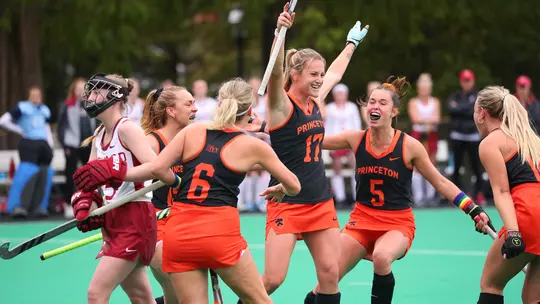
There were two paths into the Olympic field for the United States field hockey team. First, there was the automatic bid that went to the winner of the Pan Am Games, where Argentina was the heavy favorite to win the event, held in late October and early November last year in Santiago, Chile.
“I thought Chile was really cool,” Yeager says. Chile was cool?
“I’d been there for the Pan Am Cup my freshman spring, so I had an idea what to expect. I stayed in an athlete village for the first time. It was a multisport event. I met a lot of athletes in a lot of sports. Rugby. Sailing. Water polo. Tennis. Track and field. It was fun.”
It was, though, a business trip.
There were eight teams in the field hockey tournament, in two groups. The top two from each group would advance to the semifinal round, which brought with it an important prize: In addition to an automatic bid for the winner, the next three finishers would at least advance to the final Olympic qualifying tournaments. The four teams who did not advance out of the group round would be eliminated from the Olympics.
The Americans began their own pursuit of the Olympic bid with a 15-0 win over Trinidad and Tobago but fell to Argentina 5-1 in the second game. Next up was Uruguay, where a loss would have meant the end of the Olympic pursuit. Instead, the U.S. won 3-0.
The semifinal matched the U.S. and the host nation, and the Americans won in a penalty shootout to reach the final against Argentina. It would be much closer than the first game, but an Argentine goal late in the fourth quarter and some big saves late in the game still left the U.S. on the short end, this time only 2-1.
Heartbreaking? Maybe. Dream-ending? No.
There would be two more qualifying tournaments with eight teams each, and the top three in each would reach the Paris Games. One of the tournaments would be in Valencia, Spain. The other would be in Ranchi, India, in the southeast of the country. The Americans would be sent to India.
“To be honest, the final was the least stressful game,” she says. “We knew we would be in the qualifier no matter what, and we weren’t favored. We’d already lost 5-1. Of course we were disappointed to have come so close, but we were also optimistic. Argentina was No. 3 in the world and we played them so close. We were definitely looking forward to India.”
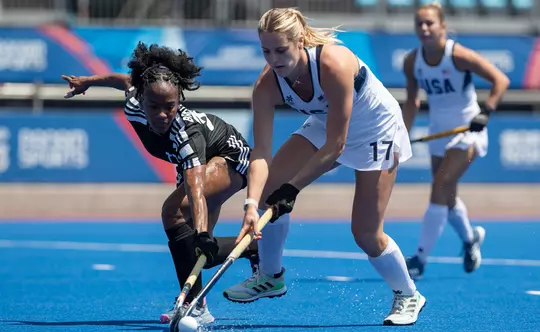
Helen Yeager, Beth’s mother, played basketball at Columbia, something her daughter laughingly refers to as “a point of contention in our house.” Michael Yeager, Beth’s brother, will be heading to Virginia this year to play baseball.
In Beth’s case, her best sport when she was younger was lacrosse, the sport she thought she’d end up playing in college. She started field hockey at a summer camp before fifth grade, and she was, well, not exactly a prodigy.
“I remember my first practice,” she says. “It was very frustrating. I didn’t have the coordination, and I’d miss the ball a lot. But I remember that I really enjoyed it.”
Those problems didn’t last. She’d play both field hockey and lacrosse until finally switching to year-round field hockey in eighth grade. By then, she had grown so much as a player that she caught the eye of the West Chester Eagles, one of the premier club teams in the country.
There was only one problem. The Yeagers lived in Rye, N.Y., at the time, and this wasn’t “Westchester,” the county in which Rye is located. This was “West Chester,” the one on the other side of Philadelphia. It would be a nearly three-hour ride … each way … if Yeager decided to join.
“The coaches told me they wanted me to come play for them, but my mother and I thought it was too far,” Yeager says. “The coaches were very persuasive though. They also said they had people coming from even further. I said I’d try it for one season of indoor and see what it was like. Once I started, I didn’t stop.”
The Yeagers would drive to West Chester once or twice after school and then would spend most weekends there. The grind and commitment were significant, but it also paid off. Yeager made her first junior national team camp after her ninth grade season, and a year later she made the U17 national team.
Her first international experience came in Holland with the W.C. Eagles in the week after she finished eighth grade. The U17 team took her to Germany in 10th grade, and then she first got her chance with the full national team.
“I was pretty stressed,” Yeager says. “I was just focusing on doing my best. Everyone was older.”
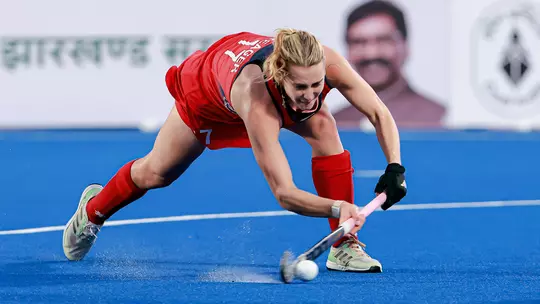
Beth Yeager says she’s a “pretty good flier,” and really she has no choice given all of the miles she’s logged on planes. She does have one problem, though. Try as she might, she just can’t fall asleep in flight.
“I don’t sleep,” she says. “I don’t watch movies or listen to music. Usually I just read, or for a long time I did schoolwork.”
One of her favorite stops was New Zealand, where she played with the U.S. team in the International Hockey Federation Pro League, a series of games between the top teams in the world that serve as qualifiers for the World Cup.
“I loved New Zealand,” Yeager says. “I loved the environment and the scenery. We went to the beach for a few days. We had fantastic weather. The field was right there. You could walk to everything.”
Getting there? How about Newark to Dallas to Sydney to Wellington?
The U.S. team’s base is Charlotte, and so for the final qualifier, the itinerary was Charlotte to Newark to New Dehli, which is 800 miles northwest of Ranchi, or another two-hour flight. Ranchi is much closer to the Bay of Bengal and, for that matter, the Indian border with Bangladesh than it is with the Indian capital city. The team left on Jan. 3 for India, and by the time returned after the qualifier and another Pro League stop afterwards, they took 11 different flights and covered more than 16,000 miles.
“India is my favorite now,” Yeager says.
With good reason. If there is a world capital of field hockey, it’s India. The sport is huge in the country, both for the women and the men. To go there for the final qualifier was going to be special. To open against India — ranked sixth in the world, compared to the U.S., who was 15th — wasn’t going to be easy.
“We already had the idea of qualifying and the stress that came with it,” she says. “Then we had to play in front of their home crowd. The Indian people are huge field hockey fans. The way they approached the game and the energy they brought, it made it even more special. It was a stressful, momentous game in front of a crowd that really cared.”
The Americans shocked the host country 1-0 in the first game. Game 2 saw the U.S. convincingly take down Italy 2-0, setting up a matchup against No. 11 New Zealand in the final game of the group phase. Because of the tiebreaking criteria, this game could have been the end of the line for the Americans with a loss.
Yeager made sure that wouldn’t be the case. She has extraordinary skills on the field hockey field, including her ability to possess and advance the ball, her field vision and her athleticism and fitness, all of which helps her team be better but doesn’t often show up in the box score.
Her best skill, though, is her ability to score off of penalty corners, especially with her “flick” shot. It’s something she’s showcased more than two dozen times already at Princeton, and it’s something she brought out when her team needed it most. It was Yeager’s flick off a second-quarter corner that gave the U.S. the only goal of the day in a 1-0 victory. With the win, the Americans vaulted into the semifinals and kept the dream alive.
“I hadn’t had a breakthrough moment internationally,” she says. “Flicking is such an important part of my game, and it’s also super important. I was so focused on it. I really wanted it. That game was so critical. I was so glad to help the team that way.”
India rebounded from its loss to the U.S. and won its next two, also advancing out of the group phase. The semifinal matchups were the U.S. and No. 9 Japan and India and No. 3 Germany, and three of those teams would reach the Olympics, the two semifinal winners and the winner of the third-place game. In other words, one of those four teams was going to have a very, very heartbreaking end to its quest.
Germany defeated India in the first semifinal, and Japan scored early against the U.S. to go up 1-0. The Americans were now in a terrible spot — lose this game, and they’d have to play India again. That was clearly the worst case scenario, but it was starting to look more and more likely.
“We had scrimmaged Japan a few days before the qualifier and tied them,” Yeager says. “We were all confident in our ability against them, but I think a little mental fatigue had set in. It had been a week of high stress. Down 1-0 in the fourth, maybe I wasn’t as optimistic. We hadn’t come back to win after being down in the fourth. I started to think that maybe we’d have to play India again to qualify. It wasn’t a freak-out moment, but it wasn’t ideal.”
Time was running out on the Americans. And then? Magically, the U.S. scored — and then scored again two minutes later. It was 2-1 United States, and suddenly the dream was within reach. The last few minutes would seem longer than the flight to get there had been. Finally, finally there was one minute to play, 30 seconds to play, 20 seconds to play.
“I have never experienced anything like that,” Yeager says. “I was on the sideline, and with 20 seconds left, it was pretty clear that they weren’t going to tie it. Then I was super excited, but I also had an inner peace. It was such a relief. I was so happy. We’d achieved something we’d been stressing about for so long. After that, I became so emotional and started crying. I was just overcome with emotion. I was sobbing for a long time. I’d stop. I’d start again. My teammates were making fun of me.”
The U.S. lost the final to Germany, but that didn’t matter. Japan, to its great credit, fought back to defeat India, leaving the host nation and the host fans stunned.
“The whole time we were there, after we beat India, the Indian fans really started to like us and follow us,” she says. “They were so supportive of us. We showed we were a good field hockey team. I was surprised by how gracious their fans were.”
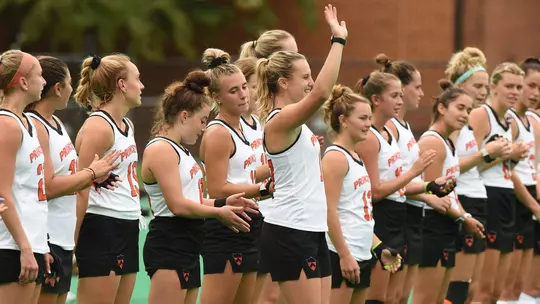
“What makes Beth a great field hockey player?”
The question is asked to Princeton head coach Carla Tagliente, who then repeats it out loud, in the way that people do when they’re contemplating an answer.
“What makes a great basketball player,” she says. “What makes a great soccer player? It’s a combination of everything. She certainly has the skills and athleticism. She’s also a great teammate, though. She loves being part of the team. She doesn’t need the spotlight at all. She just wants to do whatever it takes to make the team win.”
When your superstar player does not buy into the team concept, then your team has instant culture issues. At the same time, when your superstar doesn’t assume the role of being the team’s best player, you have instant on-field issues. It’s a big balancing act.
Put Yeager on the field, and you can pick her out immediately. Put her on the team bus or the hotel lobby? She blends in with everyone else seamlessly. That’s how you balance.
“She’s one of the most dedicated and hardworking people I know,” says Ella Hampson, a rising Princeton junior as well. “Beth goes above and beyond to improve herself both on and off the field and also for those around her. Her relentless dedication and unwavering work ethic inspire everyone around her to strive for excellence.”
The Princeton field hockey team is a very close-knit one. Yeager came to Princeton from Sacred Heart Academy in Greenwich, where she also valued being part of a school team in addition to the national team.
“I was very stressed coming to Princeton,” Yeager says. “I had expectations for myself. I also had performance anxiety. I didn’t want to think too highly of myself, and I was very concerned for the team dynamic. I didn’t want anyone to think I was arrogant. The team is so important to me. I loved my Sacred Heart team. That’s what makes your experience. Your team is for your whole life. I’d heard so much about how incredible the Princeton team is. It was really important to me.”
From Day 1, Yeager has done it perfectly. Her reputation as a national team player preceded her to Princeton, and her ability was obvious from the opening whistle of her first game. At the same time, she is also an ultimate team player, and that has defined her as a Tiger as much as any goals she’s scored.
“Beth is one of the most skillful and hardest working players you will ever meet,” says Lily Webb, who came into Princeton with Yeager and who will be a senior. “Her drive and resilience inspire everyone around her, especially her teammates. We are all in awe of Beth’s performances for the national team and are beyond excited to watch her in Paris.”
When Webb means “watch her in Paris,” she means it literally. She is there to see her teammate play. So are four other Tigers: Robyn Thompson, Olivia Caponiti, Ella Cashman and Aimee Jungfer.
As important as Princeton is to Yeager, she also knew that she would have to step away from the team for a year if she was going to part of the Olympic qualifying run. There were just too many training sessions in Charlotte, too many Pro League trips, too many tournaments to be able to stay in school at all, let alone stay in school and play.
Without Yeager and without the large graduating class of the year before, Princeton had a different kind of season in 2023. This time, it was a team without any major stars, not to mention a team built around youth. The Tigers, often playing every player on the roster in each game, scrapped all season, knocking off a Top Five Maryland team and reaching the Ivy League championship game before falling on a goal in the final minute.
“My first instinct was that I wanted to be involved,” she says. “I watched every game. I stayed in touch with everyone. I had a really hard time leaving Princeton. I wanted to leave because I knew had I to, but I didn’t really want to leave. I wanted to go and play with them. It was hard to watch and not be involved. I loved seeing them play, seeing how much they had, seeing how they came together.”
Once the Olympics end, she’ll have two weeks until she will be back on campus, readying for her junior year. The players who return from last year all gained valuable experience last year, and the addition of a top freshman class will be added into the mix. Yeager will be part of that mix, the biggest part, and even in her absence, her teammates voted her one of the team captains for 2024.
“Beth is an amazing teammate and leader because she plays with intensity and holds everyone accountable, while also being encouraging and supportive,” says junior Talia Schenck. “I missed having her last season, but I’ve also have loved watching her and the national team’s path to the Olympics. Her journey is inspiring, and I can’t wait to cheer her on this month and to play with her again in August.”
Yeager is an economics major. Perhaps after she graduates and her field hockey career ends, she’ll head to law school, or work in finance.
“I’m excited to be back,” she says. “It’ll be a crazy turnaround after the Olympics, but I’m really excited. I missed the team. I missed my friends. I missed going to class. It’ll be weird. My grade will be seniors. This past year made me appreciate Princeton even more. I think I took some things for granted. Now I want to take advantage all of the things Princeton has to offer.”
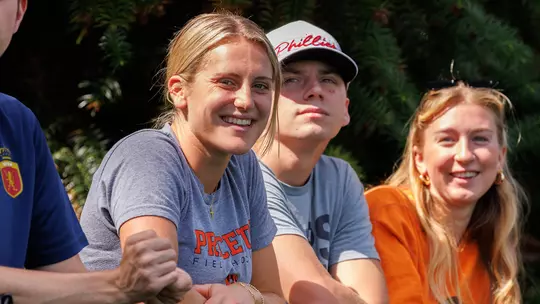
The U.S. women’s national team had some time off after the Olympic qualifier but before the Pro League games in India. Yeager split her time between the beach … and the hospital.
She came down with a gastrointestinal issue that forced her to spend two nights in a hospital in the town of Bhubenswar. She actually had played in a game against the Netherlands earlier that first day and then missed games against Australia and China before playing against India after being released. When she finally was back in the United States, she needed surgery on her wrist.
The team that came in second in Ranchi to earn the Olympic spot was not necessarily going to be the team that would go to Paris. There would be more training sessions and another Pro League trip, this time to Belgium and England. The final team wouldn’t be chosen until early June. To be specific, June 10.
“We knew it was going to be June 10th,” she says. “That was the big day for all of us. We tried not to talk about it, and the night before was hard to get to sleep, that’s for sure. I kept checking my phone to see what time it was.”
Stressful? Yes. Because of her unique ability, especially on penalty corners, Yeager figured to be something of a lock for the final roster, especially since she was back to full strength. Still, nothing was certain until she got the email confirming it.
“The initial emotion of qualifying was overwhelming, a state of shock,” she says. “The initial feeling of being selected to the final roster was one of relief and gratitude.”
The United States team is in Group B in the 12-team field, with games against Spain, Australia, Great Britain and South Africa after the opener against Argentina. Winning a medal won’t be easy, and the team is first looking to get to the quarterfinal round.
“It’s going to be amazing,” she says. “The whole Olympic experience will be. It’s so exciting, and now it’s getting to be real.”
— by Jerry Price
